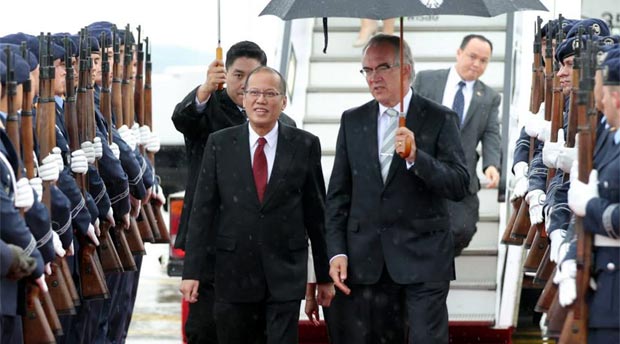
President Benigno Aquino arrives at the Berlin Tegel Airport in Berlin, Germany for his official visit. Malacanang Photo
BERLIN—President Benigno Aquino is convinced he had gathered enough support behind the Philippines’ call for a peaceful resolution of conflicts in the South China Sea, particularly through international arbitration.
“The short answer is yes,” he told reporters over coffee late Friday night (Berlin time) when asked if he had accomplished his “mission” to rally European leaders behind Manila’s position to settle its territorial dispute with Beijing through international arbitration.
With Spain, Belgium, France, and Germany all seeking a resolution through mechanisms provided under international law, Aquino said it was time to “get to a stage where we have reasonable and doable objectives.”
Aquino said he had been told by some of his European counterparts that they had been asking China about its Nine-Dash Line claim over around 90 percent of the South China Sea. He said another point of inquiry was “adherence” to the United Nations Convention on the Law of the Sea (UNCLOS).
“There seems to be a push,” he said.
Aquino is set to leave for Boston later at 6:30 p.m. (12:30 a.m. in Manila).
One of the most categorical statements of support came from German Chancellor Angela Merkel who described “international dispute settlement arrangements that we have on the basis of UNCLOS” as “a very good way forward in order to settle those differences.”
“We share the concerns about the tensions arising in that particular part of the world and we believe in good, pragmatic approaches,” she said. “But we also believe in solid, legal settlements of the disputes.”
She cited similar cases in Europe where Germany took the position that “we should embark on such roads where the limitation for example of borders has to be settled by arbitration.”
“So that is the road that we would opt for,” she said. “A peaceful approach and diplomatic approach is always the one that is called for.”
In March, the Philippines filed an arbitration case with the United Nations Arbitral Tribunal, a process that China has refused to participate in. Beijing has said it prefers to deal with the disputes through bilateral talks.
“This problem has been put on the back burner for far too long and that’s why in the Philippines’ case, we want a resolution for this,” he said in a joint press conference with Merkel at the Federal Chancery here Friday.
“It is not a situation that can be ignored and it has to be confronted and perhaps that will prod everybody to arrive at a solution based on international law, based [on] justice and fairness.”
The Philippines has been trying to “internationalize” the issue, arguing that instability in the South China Sea could also affect global trade.
Aquino sought to drive home the same message in another policy speech before members of the Koerber Stiftung Foundation and the Asia Pacific Association Friday night.
Aquino said “tensions in the South China Sea have created uncertainty in our region” and “this uncertainty poses threats to the rule of law.”
“Ladies and gentlemen, if it is true that international law embodies our consensus as co-inhabitants in a single, global community, then it stands to reason that violating it means flouting not just a single nation, but the entire community of nations,” he said.
“Conversely, observing international law strengthens a dynamic harmony among nations, which could then be harnessed to uplift the lives of all.”
RELATED STORY
German Chancellor Merkel backs PH stance on China row

